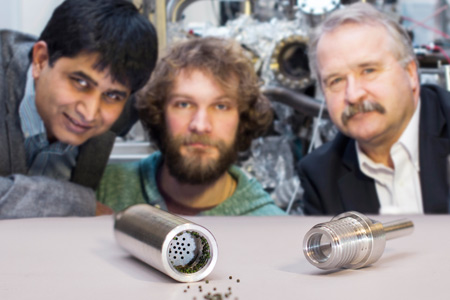By Henrik Larsen and Lisa Svane Baltzer Parsberg
Present your idea in 10 minutes and wait a week. You will then find out whether you have been granted support to bring your innovative project to market. That is the offer from the EU-funded Climate-KIC network, whose Accelerator Programme provides backing for innovative Scandinavian projects.
The Danish company RenCat is one of the start-ups to have benefited from support from the programme. RenCat has created a carbon-neutral hydrogen generator with the potential to replace highly polluting diesel generators. Initially, RenCat is seeking to penetrate the mobile network market in areas distinguished by poor power supply in Africa, Asia, or India, for example.
“In the early phase of Climate-KIC’s Accelerator Programme, we were awarded EUR 20,000. This enabled us, for example, to employ a person to build a prototype of the generator, and we received assistance in finding our first partners,” relates Debasish Chakraborty, PhD and Scientific Business Developer at DTU Physics, who is one of the company’s founders.
RenCat developed the technology behind the hydrogen generator at DTU Physics, and the company has just landed its first major customer abroad—Grameen Phone, which is the biggest telecoms company in Bangladesh. The plan going forward is to test RenCat generators in the field in partnership with Grameen Phone.
RenCat is currently working to attract more investors and new partners, and is receiving consultancy and support in this context from Climate-KIC, whose initiatives include holding boot camps and masterclasses on a variety of themes designed to underpin start-up companies’ processes. Climate-KIC also runs courses in handling finances, gives start-ups the opportunity to test out ideas and, in particular, provides access to consultancy from experienced professionals.
RenCat’s first goal is to establish presence some of the areas in the world where mobile telephony is becoming widespread, but where there is as yet no actual power supply grid.
“Mobile telephony masts cannot function without current, and in places where a power grid has not yet been established, it is common to use diesel generators today. We are keen to change this situation with our carbon-neutral generators,” relates Debasish Chakraborty, co-founder and CEO.

RenCat’s technology can also be used to generate fuel for hydrogen-powered vehicles, and the company is currently looking into opportunities to find partners in the automotive industry.
The two other founders of RenCat are Ib Chorkendorff, Professor at DTU Physics (far right), and Morten Godtfred Nielsen, PhD (centre).
Climate-KIC (Climate Knowledge & Innovation Community) is a European network whose purpose is to generate marketing opportunities for small environmental companies and start-ups working on solutions to climate challenges. The network does not focus exclusively on conventional Cleantech areas such as solar and wind power, but on all solutions with significant potential to reduce global resource consumption, involving everything from shareconomic initiatives to concepts targeted at energy optimization and reducing pollution.
Funding is supplied from the EC’s European Institute of Innovation and Technology (EIT) and from corporate and university partners.
In Denmark, Climate-KIC works with partners including DTU, the University of Copenhagen, Grundfos, Velux, the City of Copenhagen, COWI, Novozymes, and Rockwool. Climate-KIC’s Nordic office is located at DTU.
Learn more
Jakob Steen Jensen, Climate-KIC, Entrepreneurship Lead, jakob@climate-kic-nordic.org
For additional information about Climate-KIC, see www.climate-kic.org
How to apply
- Submit your application before one of the three deadlines in 2016: 1 February, 15 May, or 1 September.
- Relevant applicants will be invited to give a 10-minute presentation and participate in a 10-minute interview two weeks later.
- A decision will be made one week after the presentation.
- Any financial support granted will be paid out three weeks later.